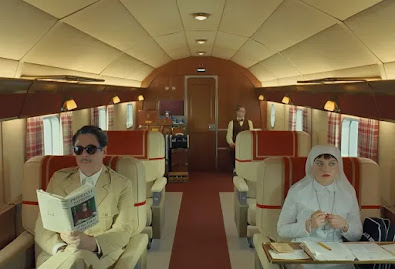Zsa-zsa Korda (Benicio Del Toro) is a cutthroat business tycoon. He’s so cutthroat, in fact, that he has suffered multiple assassination attempts, including another one as “The Phoenician Scheme” opens when his private plane is sabotaged, leading him to storm the cockpit, eject the pilot from his seat, and take the controls. It’s classic Wes Anderson: a comically deadpan visual revealing a deeper sense of character, a man of impressive self-regard who prefers to go it alone. He sees himself as a king, conveyed in the images from above in which he relaxes in a tub while being waited on hand and foot, and will extract anyone or anything for everything, by violence, if necessary, underlined in the hand grenades he carries everywhere and hands out like party favors. And all of it is wrapped up in a Del Toro’s surprisingly levelheaded demeanor; this is just the way world works.
Ah, but his latest assassination attempt triggers a near-death experience, seen in black and white images of the apparent pearly gates, kind of the Andersonian version of “Defending Your Life” (one guess who plays God) and prompting Zsa-Zsa to summon his only daughter, Liesel (Mia Threapleton), to install her as his business successor. On the verge of taking her vows, she agrees to a probationary period in by tagging along with dad on his location-hopping journey to rally investors for a gargantuan infrastructure project in fictional Phoenicia. The details might be so byzantine that Anderson charts them onscreen for our benefit, but they are also beside the point. As Zsa-zsa is gradually made to see the error of his ways, the convoluted Phoenician scheme proves merely an elaborately droll manifestation of the age-old observation of cowed dastardly men everywhere: as the father of a daughter.
Zsa-zsa and Liesel are joined in this journey by Bjorn (Michael Cera), a Norwegian entomologist first enlisted as their tutor but then morphing into something more like an administrative assistant before morphing again, improbably giving Cera the chance to play, in a manner of speaking, Timothée Chalamet. Indeed, while the character might seem just along for the ride to grant Cera entry into the Wes Anderson Players, he is so much more. He’s not who he says is, as he says, but also exactly who he says he is, as he also says, reflecting the emergent dimension of his travel companions and underlining how all the supporting characters, in one way or another, are there specifically to help spotlight the main ones.
Costumed severely to start, without a word Liesel begins applying lipstick and wearing colorful tights, embracing rather than rejecting the material world. At the same time, Liesel argues for her father’s rejection of that very world’s scruples, conveyed in Anderson’s preferred flattened dialogue, turning every conversation into a kind of negotiation of ethics and morals as the epic convolutions of the business deal are neatly contrasted against Liesel’s plain-spoken explanation of faith. When Zsa-zsa asks if the Bible condemns slavery, Liesel replies that she does, a remarkable line-drawing bit of dialogue that rejects using Scripture as a get out jail free card. I’m pretty sure that’s not twee. And near the end, when Zsa-zsa’s plane has gone from going virtually unpopulated to chock full, it’s another one of those visual jokes communicating a heartless man who has, in his own way, in his own time, opened his up, at least a little.
If “The Phoenician Scheme” is a spiritual movie, in the end, it proves a transcendental one too. It might not meet all the criteria of the transcendental style, not as Paul Schrader defined it anyway, not least because Anderson’s camera movement remains maximal, not minimal, even in the concluding scene. That concluding scene, though, which I won’t give away, feels like the end point of the transcendental blueprint, nonetheless, taking the film’s ornate world, building to a moment where it throws that world in flux, and then coming out the other side with something so intimate and quiet that it feels holy.
















